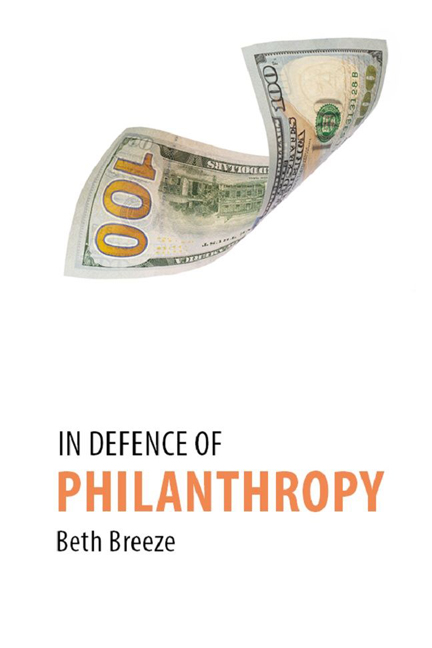Book contents
- Frontmatter
- Contents
- Acknowledgements
- Introduction: the need for a defence of philanthropy
- 1 What is philanthropy?
- 2 Is philanthropy really under attack?
- 3 The academic critique
- 4 The insider critique
- 5 The populist critique
- 6 Why do attacks on philanthropy stick and what can be done about it?
- Conclusion: in praise of philanthropy
- References
- Index
Conclusion: in praise of philanthropy
Published online by Cambridge University Press: 22 December 2023
- Frontmatter
- Contents
- Acknowledgements
- Introduction: the need for a defence of philanthropy
- 1 What is philanthropy?
- 2 Is philanthropy really under attack?
- 3 The academic critique
- 4 The insider critique
- 5 The populist critique
- 6 Why do attacks on philanthropy stick and what can be done about it?
- Conclusion: in praise of philanthropy
- References
- Index
Summary
Having shared stories of a range of philanthropists from across the centuries and across the world, this concluding chapter starts with three men from the second half of the nineteenth century – an English constitutional expert, a Swedish chemist and a Swiss businessman – mentions 14 cows and a princess, and ends with a namecheck for Noah (of the Ark) and the Roman god Janus. All will become clear.
Writing about the need for the British monarchy to avoid public and parlia mentary scrutiny, Walter Bagehot declared, “We must not let in daylight upon magic” (Bagehot 1867). While an air of mystery may have proved useful for the Crown in maintaining support for its role and relevance in modern society, this is clearly not the case for philanthropy. Reticence to engaging with the growing chorus of concerns about the legitimacy and impact of private giving, and the absence of counterarguments to academic, insider and populist critiques, has left philanthropy looking distinctly dodgy rather than helped it to maintain an air of advantageous mystique. All those involved in the philanthropy sector – whether as donors, doers or part of the mediating infrastructure – need to get better at explaining the positive value and contribution of philanthropy. Letting a little daylight in on how and why philanthropy happens in practice – every day, in every community, with everyone involved as givers and takers – might help to slow, or even reverse, the tide of unfavourable and unhelpful narratives.
Twenty-one years after Bagehot's declaration, a Swedish man, Ludvig Nobel, died in France unexpectedly and prematurely from a heart attack. After a jour nalistic mix-up where the deceased man was confused with his brother, Alfred Nobel found himself in the unusual position of being able to read his own obituary. What he read horrified him: he was described as a chemist whose invention of dynamite had made it possible to kill more people more quickly than anyone else who had ever lived. Unsurprisingly, Alfred became obsessed with improving his posthumous reputation and in 1895 signed his last will and testa ment in which he bequeathed his substantial fortune to create the Nobel Prizes for outstanding achievements in literature, peace, economics, medicine and the sciences.
- Type
- Chapter
- Information
- In Defence of Philanthropy , pp. 149 - 160Publisher: Agenda PublishingPrint publication year: 2021



